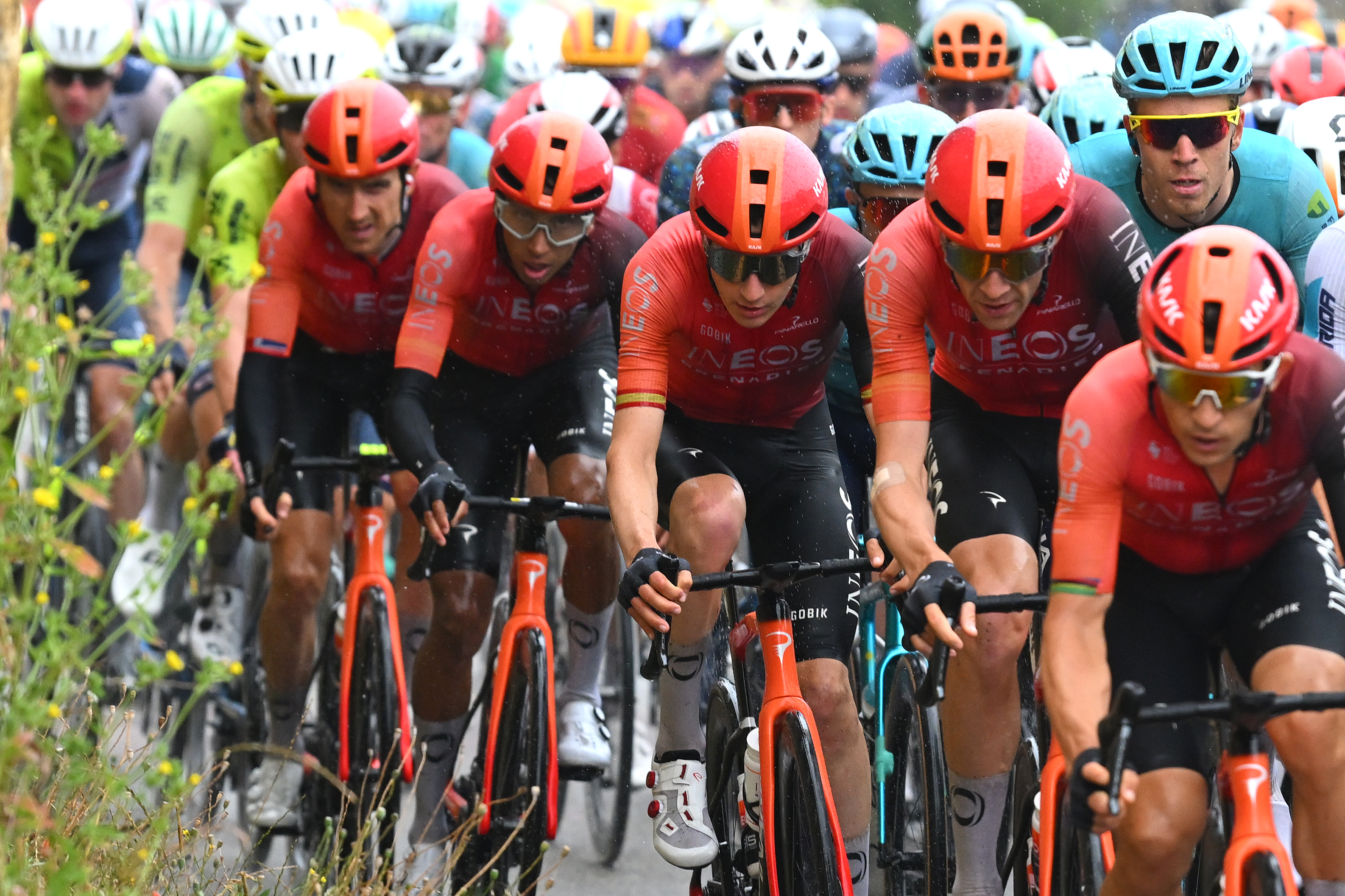
It’s always a good barometer of success at the Tour de France to check out the vibe around the team buses. You could do a lot worse than just standing still and watching riders, journalists, team staff and fans interact to see where a team positions itself. UAE Team Emirates, the team of Tadej Pogačar, obviously, were always popular, with many a scrum beyond the gilded rope. Visma-Lease a Bike and Soudal Quick-Step, with Jonas Vingegaard and Remco Evenepoel respectively, weren’t too far behind in the demand stakes. Even Red Bull-Bora-Hansgrohe, with their new livery, had quite a bit of interest, despite their disappointing race, with leader Primož Roglič abandoning after his stage 12 crash.
Ineos Grenadiers, once the team of the ‘death star’, and the most popular bus in the peloton, didn’t have the same vibes. By the end of the Tour, there was little clamour for the riders or the team, and the only interviews happening were post-mortems of a Tour which did not hit the heights expected. The squad were posting things about Carlos Rodríguez being a “fighter” by the end on social media; there were few celebrations, and things seemed quite flat.
The British team did not have too bad a race, per se. They finished seventh on general classification through Carlos Rodríguez, second on stage nine with Tom Pidcock and third on stage 18 with Michał Kwiatkowski. If you look at the prize money table, a quick way to see who had a good and bad Tour, Ineos are seventh, in the upper half. It’s not disastrous.
However, it would also not be a stretch to say that Ineos Grenadiers had their worst Tour since 2014, so in a decade. Every other edition has at least seen a stage win, or a high finish on GC, or even an overall victory, through Chris Froome, Geraint Thomas or Egan Bernal. Seventh on GC and a couple of near misses on stages just pales into comparison with past success.
That, in a way, is the problem that Ineos Grenadiers have, and will always have, until they start becoming serial winners again. The team, then Team Sky, won seven Tours de France between 2012 and 2019, and despite ethical questions being raised following a doping ban handed to team doctor Richard Freeman, still remain the benchmark for many.
It’s not that straightforward, though. As Red Bull boss Rolf Adag told me last week: “I wouldn't say the number one team was Ineos, I would say it was Team Sky to be honest. Ineos seemed to maintain, which now is looking back. Ineos 'only' won one Tour. If you try to maintain it, people will overtake you left and right.”
The noises from Ineos at the end of the Tour were of acceptance, and conciliatory.
“The reality is we're not where we used to be,” Ineos Grenadiers CEO John Allert conceded to ITV Sport late on in the Tour. “We're not where we want to be yet, either. We're somewhere in the middle. Transition is an uncomfortable place to be. But I think the only choice we have is the one that we're doing at the moment and that's embracing transition.
“Is that easy? No. Is it fast? No. Is it comfortable? No. But you know, we need to embrace it and just get on with it. And that's what we're doing. And this Tour I guess is a marker of a point in transition. It's not where we were for certain. But it's also not where we're aiming to be either.”
The truth is, Ineos missed out on the generational talents of cycling right now - they don’t have a Pogačar, a Vingegaard or an Evenepoel. They did not sign Primož Roglič. They also don’t currently look like they have the next big thing, while UAE have both Juan Ayuso and Isaac Del Toro, for example. As Allert said, it won’t be fast or comfortable.
They had and have Bernal, but the Colombian could have died in a high-speed crash in early 2022, and is yet to reach his previous heights yet; the 2021 Giro d’Italia remains the last Grand Tour his team won. Thomas has come close since then, with podiums at the Tour and the Giro, but he’s retiring next year, and the future of one of the world’s biggest cycling teams can no longer rest on his shoulders.
The team still have one of the larger budgets in the sport, but have clearly been overtaken by others in performance, talent, and results. As their billionaire owner, Sir Jim Ratcliffe, and their former team boss, Sir Dave Brailsford, become more interested in Manchester United FC, one wonders how long the cycling team can continue to drift.
Ultimately, it’s time to stop expecting Ineos to be world-beaters any time soon. The pressure is there because of who they were, and because they’re the only British squad on the WorldTour, but things will not change quickly. If this is the nadir, then things aren’t too bad, but Ineos Grenadiers are likely to be in the wilderness a while longer yet.
This piece is part of The Leadout, the offering of newsletters from Cycling Weekly and Cyclingnews. To get this in your inbox, subscribe here.
If you want to get in touch with Adam, email adam.becket@futurenet.com.







